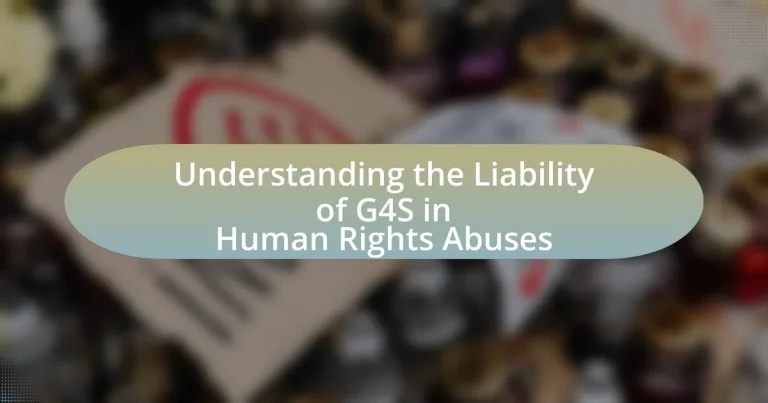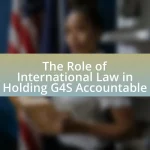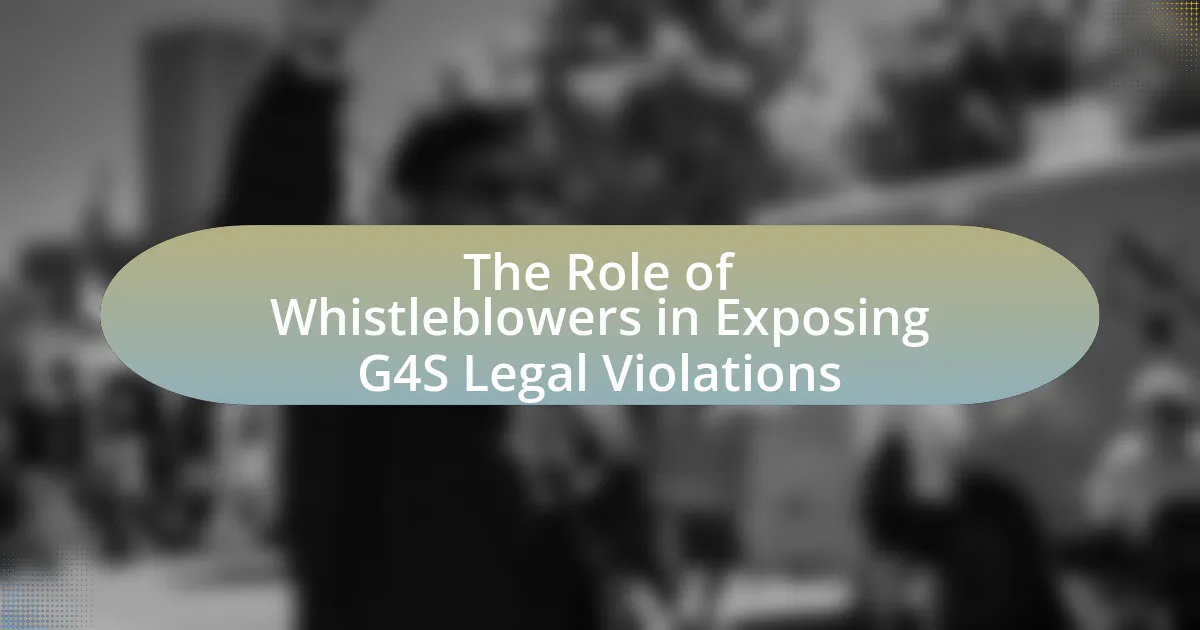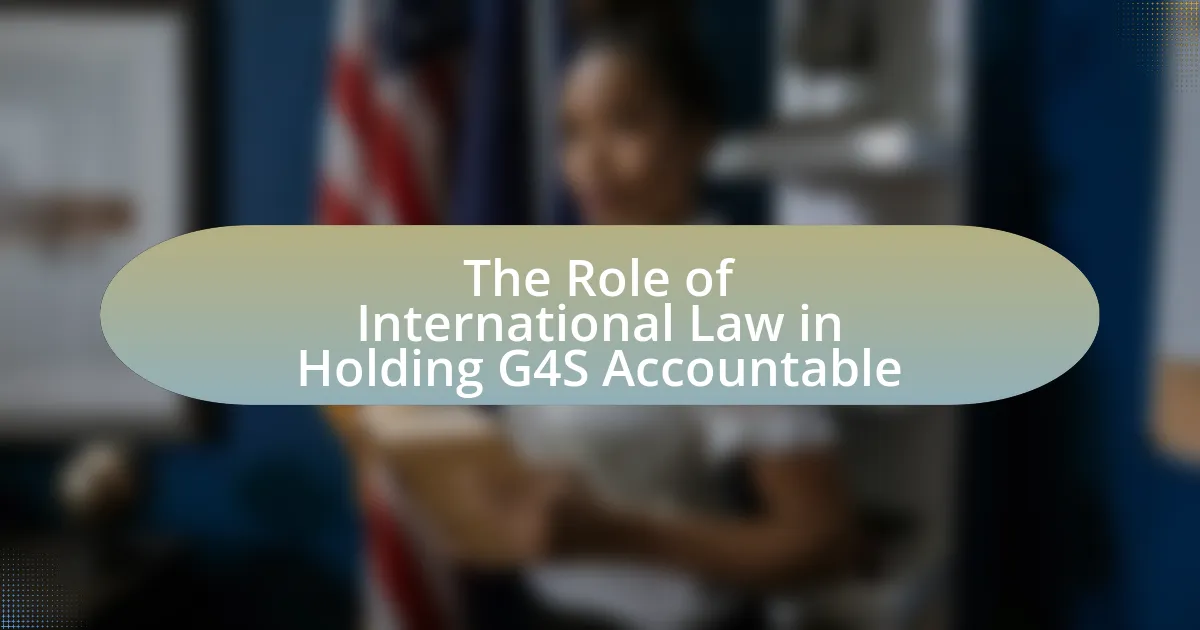G4S, a prominent private security contractor, faces significant scrutiny regarding its liability for human rights abuses linked to its global operations, particularly in immigration detention and prison management. The article examines allegations of complicity in human rights violations, including excessive use of force and inadequate care for detainees, as documented by organizations such as Amnesty International and Human Rights Watch. It further explores the implications of G4S’s business model on its accountability, the legal frameworks governing its operations, and the potential consequences of its actions on its reputation and financial standing. Additionally, the article discusses the role of stakeholders, including consumers and organizations, in advocating for human rights and holding G4S accountable for its practices.
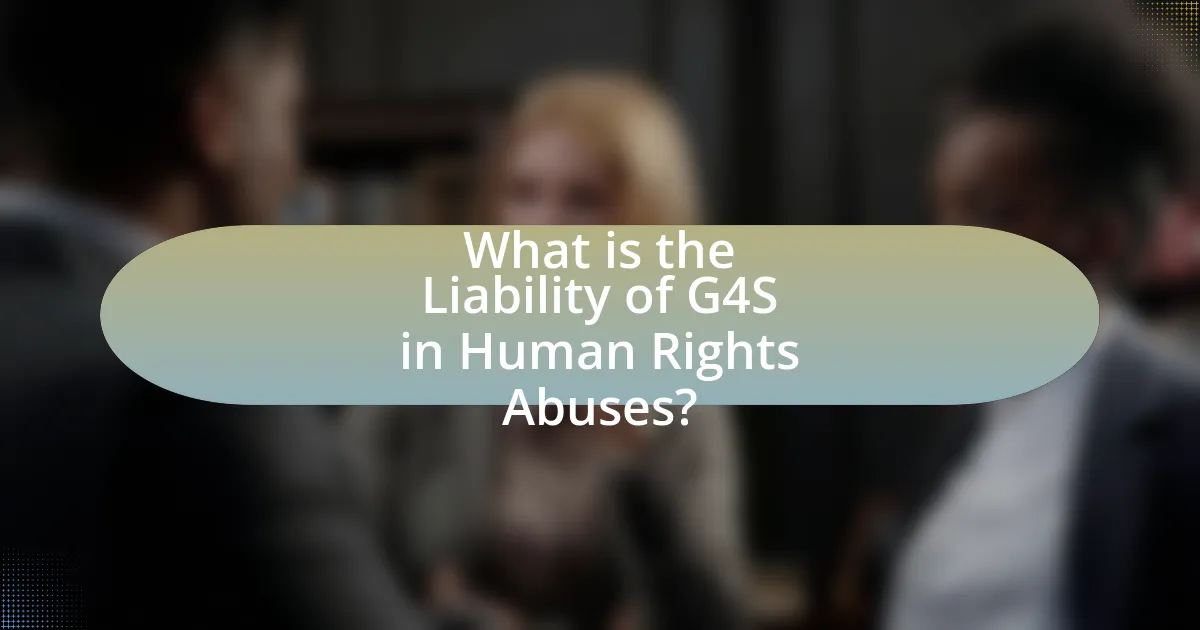
What is the Liability of G4S in Human Rights Abuses?
G4S can be held liable for human rights abuses through its role as a private security contractor involved in various operations globally. The company has faced allegations of complicity in human rights violations, particularly in contexts such as immigration detention and prison management. For instance, reports from organizations like Amnesty International and Human Rights Watch have documented instances where G4S personnel were implicated in abusive practices, including excessive use of force and inadequate care for detainees. These findings suggest that G4S’s operational practices may violate international human rights standards, thereby establishing a basis for liability.
How does G4S’s role in security services relate to human rights?
G4S’s role in security services is closely related to human rights as the company has faced scrutiny for its involvement in various human rights abuses globally. The provision of security services by G4S, particularly in conflict zones and detention facilities, has raised concerns regarding the treatment of individuals, including allegations of excessive force, unlawful detention, and inadequate conditions. Reports from organizations such as Amnesty International and Human Rights Watch have documented instances where G4S’s operations have contributed to human rights violations, highlighting the need for accountability and adherence to international human rights standards in their security practices.
What specific human rights are at risk in G4S operations?
G4S operations risk several specific human rights, including the right to life, the right to security, and the right to freedom from torture and inhumane treatment. Reports indicate that G4S has been involved in incidents where excessive force was used, leading to fatalities and injuries, which directly violate the right to life and security. Additionally, allegations of mistreatment of detainees in facilities managed by G4S highlight risks to the right against torture and inhumane treatment. These concerns are documented in various human rights reports, including those from Amnesty International and Human Rights Watch, which detail instances of abuse and neglect in G4S-operated facilities.
How does G4S’s business model impact its liability for human rights abuses?
G4S’s business model, which emphasizes privatization of security services and operational efficiency, increases its liability for human rights abuses due to the potential for inadequate oversight and accountability. The company’s reliance on subcontracting and cost-cutting measures can lead to insufficient training and supervision of personnel, resulting in human rights violations. For instance, reports have documented instances where G4S personnel were involved in excessive use of force and mistreatment of detainees, highlighting the risks associated with a profit-driven approach to security. This model creates a complex legal landscape where G4S may face increased scrutiny and liability under international human rights standards, as evidenced by various legal actions and public criticisms directed at the company for its role in controversial operations globally.
What legal frameworks govern G4S’s liability for human rights abuses?
G4S’s liability for human rights abuses is governed by various legal frameworks, including international human rights law, domestic laws in the countries where it operates, and corporate accountability standards. International human rights law, such as the Universal Declaration of Human Rights and the International Covenant on Civil and Political Rights, establishes obligations for companies to respect human rights. Additionally, domestic laws, such as tort law and specific legislation addressing human rights violations, can hold G4S accountable in local jurisdictions. Furthermore, frameworks like the UN Guiding Principles on Business and Human Rights outline the responsibilities of businesses to prevent and address human rights abuses, reinforcing the legal obligations that G4S must adhere to in its operations.
What international laws apply to private security companies like G4S?
International laws that apply to private security companies like G4S include the United Nations Guiding Principles on Business and Human Rights, which outline the responsibility of businesses to respect human rights, and the Montreux Document, which provides guidelines on the legal obligations of states and private military and security companies in armed conflict. These frameworks emphasize accountability and adherence to international humanitarian law, ensuring that private security firms operate within legal boundaries and uphold human rights standards. The application of these laws is critical in assessing G4S’s liability in cases of human rights abuses, as they establish a legal basis for holding companies accountable for their actions in conflict zones and other sensitive environments.
How do national laws influence G4S’s accountability for human rights violations?
National laws significantly influence G4S’s accountability for human rights violations by establishing legal frameworks that dictate corporate responsibility and liability. These laws can impose penalties, require compliance with human rights standards, and facilitate legal recourse for victims. For instance, in countries where laws mandate adherence to international human rights treaties, G4S may face legal actions if found complicit in violations. Additionally, national legislation, such as the UK’s Modern Slavery Act, holds companies accountable for human rights abuses in their supply chains, thereby directly impacting G4S’s operational practices and accountability measures.
What are the implications of G4S’s liability for human rights abuses?
G4S’s liability for human rights abuses can lead to significant legal, financial, and reputational consequences. Legally, G4S may face lawsuits and regulatory actions, which can result in substantial financial penalties and the requirement to implement corrective measures. Financially, the company could experience a decline in contracts and partnerships, as clients may seek to distance themselves from a firm associated with human rights violations. Reputationally, G4S risks damaging its brand image, leading to loss of public trust and potential boycotts, as evidenced by various human rights organizations calling for accountability and transparency in the company’s operations.
How do human rights abuses affect G4S’s reputation and business operations?
Human rights abuses significantly damage G4S’s reputation and disrupt its business operations. Negative media coverage and public backlash from allegations of human rights violations lead to a loss of trust among clients and stakeholders. For instance, G4S faced scrutiny for its involvement in controversial detention centers, which resulted in contract cancellations and reduced business opportunities. Additionally, human rights organizations have documented instances of abuse linked to G4S, further tarnishing its public image and prompting calls for accountability. This negative perception can lead to decreased investor confidence and challenges in attracting new contracts, ultimately impacting the company’s financial performance and market position.
What are the potential legal consequences for G4S in cases of human rights violations?
G4S may face significant legal consequences for human rights violations, including civil lawsuits, criminal charges, and regulatory penalties. Civil lawsuits can arise from individuals or groups alleging harm due to G4S’s actions, potentially resulting in substantial financial damages. Criminal charges could be pursued if G4S personnel are found to have engaged in unlawful conduct, leading to fines or imprisonment for responsible individuals. Additionally, regulatory bodies may impose penalties or sanctions, affecting G4S’s ability to operate in certain jurisdictions. Historical cases, such as the lawsuits against G4S related to its operations in conflict zones, illustrate the potential for legal repercussions stemming from human rights abuses.
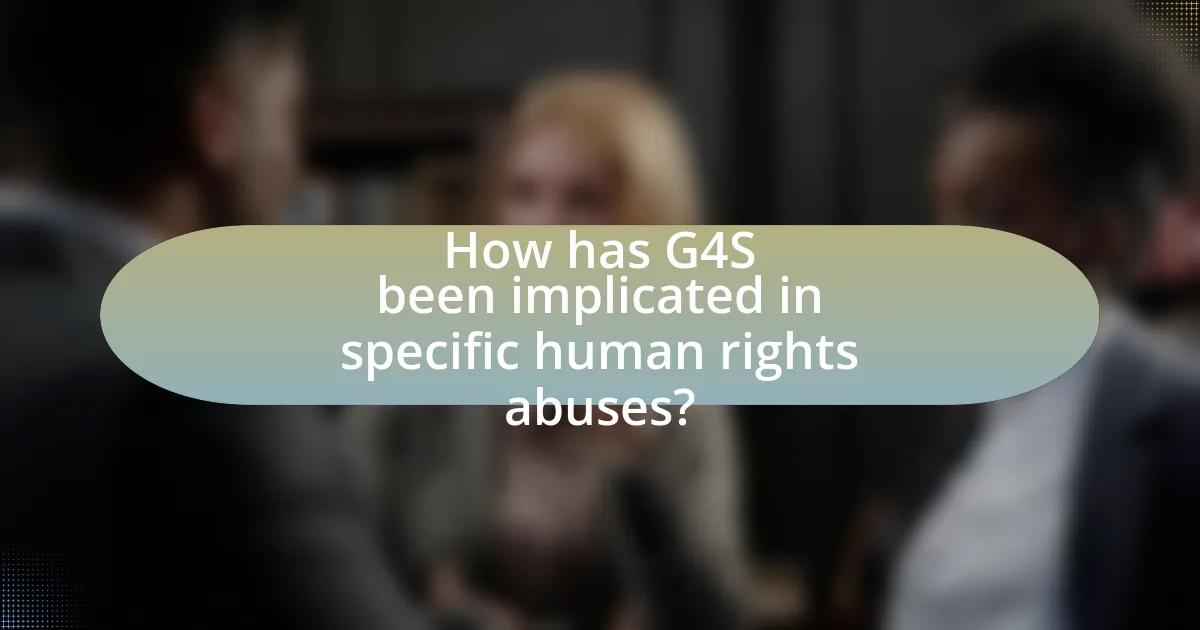
How has G4S been implicated in specific human rights abuses?
G4S has been implicated in specific human rights abuses through its involvement in the management of detention centers and security operations in conflict zones. Reports have documented instances of excessive use of force by G4S personnel, particularly in facilities where detainees faced mistreatment and inadequate living conditions. For example, in the UK, G4S faced criticism for its role in the management of immigration detention centers, where allegations of abuse and neglect were reported by organizations such as the UK’s Independent Monitoring Boards. Additionally, G4S has been linked to human rights violations in Israel and Palestine, where its security services were accused of complicity in the mistreatment of Palestinian detainees. These allegations are supported by investigations from human rights organizations, including Amnesty International and Human Rights Watch, which have highlighted the company’s role in facilitating environments where abuses occur.
What are some notable cases of human rights abuses involving G4S?
G4S has been involved in several notable cases of human rights abuses, including allegations of excessive use of force and mistreatment of detainees. One significant case occurred in 2010 when G4S was implicated in the death of Jimmy Mubenga, a deportee who died during an attempted removal from the UK, leading to public outcry and an investigation into the company’s practices. Additionally, in 2013, G4S faced criticism for its role in the management of detention centers in the UK, where reports indicated poor conditions and inadequate care for detainees. Furthermore, in Israel and the occupied Palestinian territories, G4S has been accused of complicity in human rights violations related to the detention of Palestinians, including allegations of torture and ill-treatment. These cases highlight the ongoing concerns regarding G4S’s involvement in human rights abuses across various contexts.
What were the circumstances surrounding these cases?
The circumstances surrounding the cases of G4S in human rights abuses involve allegations of mistreatment and neglect in facilities managed by the company, particularly in prisons and immigration detention centers. Reports indicate that G4S personnel were implicated in incidents of excessive force, inadequate medical care, and failure to protect vulnerable individuals, leading to significant human rights violations. For instance, investigations by human rights organizations have documented instances where detainees suffered physical harm due to improper handling by G4S staff, highlighting systemic issues within the company’s operational practices. These findings underscore the broader implications of G4S’s role in managing facilities where human rights standards are expected to be upheld.
What outcomes resulted from these incidents for G4S?
The outcomes resulting from incidents involving G4S included significant reputational damage, financial losses, and increased scrutiny from regulatory bodies. Following various human rights abuses linked to its operations, G4S faced public backlash, leading to a decline in contracts and partnerships, particularly in sensitive sectors such as security for governmental and humanitarian organizations. Additionally, the company encountered legal challenges and potential liabilities, which further strained its financial performance and necessitated a reevaluation of its operational practices to mitigate future risks.
How does G4S respond to allegations of human rights abuses?
G4S responds to allegations of human rights abuses by stating that it takes such claims seriously and conducts thorough investigations into any reported incidents. The company emphasizes its commitment to human rights and adheres to international standards, including the UN Guiding Principles on Business and Human Rights. G4S has publicly stated that it aims to ensure that its operations do not contribute to human rights violations, and it implements training programs for staff to promote awareness and compliance with human rights policies.
What measures does G4S take to address and prevent human rights violations?
G4S implements several measures to address and prevent human rights violations, including adherence to international human rights standards, comprehensive training programs for employees, and regular audits of operations. The company has established a Human Rights Policy that aligns with the UN Guiding Principles on Business and Human Rights, ensuring that its practices respect human rights across all operations. G4S also conducts risk assessments to identify potential human rights impacts and engages with stakeholders to address concerns. Additionally, the company has a grievance mechanism in place, allowing individuals to report human rights abuses, which is monitored for effectiveness. These measures are part of G4S’s commitment to maintaining accountability and transparency in its operations.
How effective are G4S’s responses in mitigating liability?
G4S’s responses in mitigating liability are generally considered ineffective, as evidenced by multiple reports of human rights abuses linked to their operations. For instance, investigations by organizations such as Amnesty International and Human Rights Watch have highlighted systemic issues within G4S, including inadequate training and oversight, which have led to incidents of violence and mistreatment. These findings indicate that G4S’s measures, such as implementing compliance programs and conducting internal reviews, have not sufficiently addressed the root causes of liability, resulting in ongoing legal challenges and reputational damage.
What can stakeholders do regarding G4S’s liability in human rights abuses?
Stakeholders can hold G4S accountable for human rights abuses by advocating for transparency, demanding adherence to international human rights standards, and engaging in dialogue with the company. Stakeholders, including investors, customers, and civil society organizations, can pressure G4S to implement robust human rights policies and conduct regular audits to assess compliance. For instance, the UN Guiding Principles on Business and Human Rights provide a framework that stakeholders can reference to ensure G4S is meeting its responsibilities. Additionally, stakeholders can support initiatives that promote accountability, such as legal actions or public campaigns that highlight G4S’s human rights record, thereby influencing the company’s operational practices and policies.
What role do consumers play in holding G4S accountable?
Consumers play a critical role in holding G4S accountable by influencing corporate behavior through their purchasing decisions and advocacy efforts. When consumers choose to boycott G4S or support companies that prioritize ethical practices, they create financial pressure that can lead to changes in G4S’s policies and operations. For instance, public campaigns and social media movements have successfully raised awareness about G4S’s involvement in human rights abuses, prompting consumers to demand greater transparency and accountability. This consumer activism can result in significant reputational damage for G4S, as seen in various instances where companies have severed ties with G4S due to public outcry. Thus, consumer actions directly impact G4S’s accountability regarding human rights issues.
How can consumers influence G4S’s practices through their choices?
Consumers can influence G4S’s practices through their choices by opting for services and products from companies that prioritize ethical standards and human rights. When consumers choose to support businesses that hold G4S accountable for its practices, they create market pressure that encourages G4S to adopt more responsible policies. For instance, consumer boycotts or public campaigns against G4S can lead to reputational damage and financial loss, prompting the company to reassess its operations and align them with human rights standards. This dynamic is supported by research indicating that companies are increasingly responsive to consumer preferences regarding corporate social responsibility, as seen in the rise of ethical consumerism, where 66% of global consumers are willing to pay more for sustainable brands.
What actions can consumers take if they witness human rights abuses by G4S?
Consumers who witness human rights abuses by G4S can take several actions, including reporting the incidents to relevant authorities, such as human rights organizations or local law enforcement. Additionally, consumers can raise awareness by sharing their experiences on social media or through public forums, which can pressure G4S to address the issues. Engaging in advocacy by supporting campaigns that call for accountability and ethical practices within G4S can also be effective. Furthermore, consumers can choose to withdraw their business or support from G4S, thereby signaling their disapproval of the company’s practices. These actions contribute to holding G4S accountable for its human rights obligations.
What best practices can organizations adopt to ensure accountability in security services?
Organizations can adopt several best practices to ensure accountability in security services, including establishing clear policies, conducting regular audits, and implementing training programs. Clear policies define expectations and responsibilities, which helps in holding personnel accountable for their actions. Regular audits, both internal and external, provide oversight and identify areas for improvement, ensuring compliance with established standards. Training programs enhance awareness of legal and ethical obligations, fostering a culture of accountability. These practices are supported by research indicating that organizations with robust accountability frameworks experience fewer incidents of misconduct and improved overall performance in security operations.
How can organizations implement human rights due diligence in their contracts with G4S?
Organizations can implement human rights due diligence in their contracts with G4S by incorporating specific clauses that mandate compliance with international human rights standards. These clauses should require G4S to conduct regular assessments of its operations and supply chains to identify and mitigate human rights risks. Additionally, contracts should stipulate that G4S must provide transparency regarding its practices and report any human rights violations promptly.
To reinforce this approach, organizations can reference the UN Guiding Principles on Business and Human Rights, which outline the responsibility of companies to respect human rights. By aligning contractual obligations with these principles, organizations can ensure that G4S is held accountable for its actions and that there are mechanisms in place for remediation in case of violations.
What frameworks exist for assessing the human rights impact of security providers?
Several frameworks exist for assessing the human rights impact of security providers, including the UN Guiding Principles on Business and Human Rights, the Voluntary Principles on Security and Human Rights, and the Human Rights Impact Assessment (HRIA) framework. The UN Guiding Principles provide a comprehensive framework for businesses to respect human rights, emphasizing due diligence and accountability. The Voluntary Principles offer guidance specifically for security providers in relation to human rights, focusing on risk assessment and management. The HRIA framework systematically evaluates the potential human rights impacts of security operations, enabling organizations to identify, prevent, and mitigate adverse effects. These frameworks are supported by international human rights standards and best practices, ensuring that security providers can operate responsibly while safeguarding human rights.
What steps can individuals take to advocate for human rights in the context of G4S?
Individuals can advocate for human rights in the context of G4S by raising awareness about the company’s involvement in human rights abuses, engaging in campaigns that promote accountability, and supporting organizations that monitor G4S’s practices. For instance, individuals can utilize social media platforms to share information and reports on G4S’s actions, thereby informing a wider audience. Additionally, participating in or organizing protests and petitions can pressure G4S to change its policies and practices. Supporting NGOs that focus on human rights, such as Amnesty International, which has documented G4S’s role in various human rights violations, can also amplify advocacy efforts. These actions collectively contribute to holding G4S accountable for its impact on human rights.
How can individuals raise awareness about G4S’s human rights record?
Individuals can raise awareness about G4S’s human rights record by utilizing social media platforms to share information, articles, and personal narratives related to the company’s practices. For instance, campaigns like “Boycott G4S” have successfully mobilized public opinion against the company by highlighting specific incidents of human rights violations, such as its involvement in the Israeli prison system, which has been criticized by organizations like Amnesty International. Additionally, organizing community events, discussions, or protests can further amplify the message and engage a broader audience in understanding the implications of G4S’s operations on human rights.
What resources are available for individuals seeking to engage with this issue?
Individuals seeking to engage with the issue of G4S’s liability in human rights abuses can access various resources, including legal aid organizations, human rights advocacy groups, and academic research. Legal aid organizations, such as the International Justice Resource Center, provide guidance on legal rights and avenues for action. Human rights advocacy groups, like Amnesty International and Human Rights Watch, offer reports, campaigns, and tools for activism related to corporate accountability. Academic research, including studies published in journals such as the Journal of Human Rights, provides in-depth analysis and context regarding G4S’s operations and their implications for human rights. These resources collectively empower individuals to understand and address the complexities surrounding G4S’s involvement in human rights issues.
